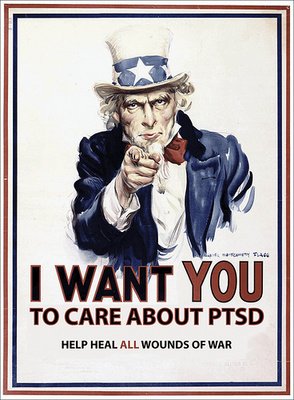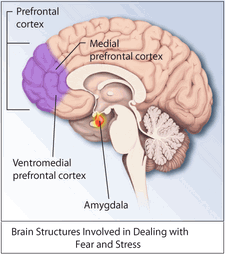
At the request of author, Dr. Elvira G. Aletta, Ph.D, this previously posted article has been edited to clarify Dr. Aletta’s views and Major Hanafin’s. The previous article has been deleted.
Robert L. Hanafin
Major, U.S. Air Force-Retired
When the New York Times wrote that the Pentagon “decided that it will not award the Purple Heart, the hallowed medal given to those wounded or killed by enemy action, to war veterans who suffer from post-traumatic stress disorder because 
it is not a physical wound.”Professional Clinical Psychologist Dr. Elvira G. Aletta, Ph.D, found this is an interesting decision on many levels. Her first reaction was, and I quote: "How typical. Go ahead and ignore all the research and data collected by psychologists, neuropsychologists and psychiatrists the world over to define and develop diagnostic and treatment protocols for this horrible condition."
However, Dr. Aletta tempered her reaction by saying. "On the other hand it is impressive that the Pentagon advisory group took any time to deliberate on this issue. Apparently they did leave the door open to future changes, which sounds like Bush administration code for, “I’m out of here. Let Obama deal with it.” But it leaves room for hope.
She was also critical of Times reporting as being, "uncharacteristically lacking in good reporting. I’d like to learn more about who was on the panel? What experts did the awards panel talk to and what are they really afraid of?Was it a hard decision to come to or a ‘non-starter’?"
She then goes on to take the New York Times reporters to task for lack of, well investigative reporting. "The reporters did not have one well-qualified behavioral health specialist speak in favor of awarding the Purple Heart to PTSD victims. How about someone from the National Institute of Mental Health? Was no one willing to go on the record?"
She also notes that, "the NYT reporters had a layman, someone clearly against such a measure, stating, “PTSD can be serious but there is absolutely no way to prove that someone truly is suffering from it or faking it. Really? What makes him qualified to make such a statement? How about a rebuttal?
On a final note, she optomistically views that , "Addressing the issue of mental health stigma is something that the government has only recently, maybe the last ten years, had the guts to face. Congress took forever but finally came around to passing legislation that advanced third party payer parity for mental health diagnostics and treatments. As a public service this action brought the issue of how mental health is seen and treated to the public."
This is what bothers Major Hanafin the most IF I were pro or con on awarding ribbons or medals for PTSD. A piece of metal regardless how noble is no treatment or cure for PTSD.
Dr. Aletta notes insightfully that, "Stigma was all over this Purple Heart decision as illustrated in the position the Military Order of the Purple Heart took. They were “strongly opposed to expanding the definition to include psychological symptoms, saying it would “debase” the honor. That’s what it is all about: the age-old mental illness fear and stigma. All other arguments are excuses for not giving wounded soldiers their due. " Dr. Aletta’s personal opinion.
Major Hanafin interprets this to mean that traditional VSOs like the MOPH, do not want Veterans or Troops to bring their STIGMA to the medal. Regardless the intent of the medal or any medal or ribbon being used to lessen the stigma. It is views like this that speak volumes about just how serious most VSOs really take PTSD. There are a few exceptions, to find them just check out which one’s have placed significant resources into dealing with PTSD let alone the stigma associated with it. If the website or newsletter of a VSO says more about Americanism than it does about PTSD rest assured that VSO cares nothing about PTSD. Major Hanafin
Dr. Aletta give this example. "Take this argument also from the Military Order of the Purple Heart. Q: “Would you award it to anyone who suffered the effects of chemicals or for other diseases and illnesses?” A: Sure! If it was a result of combat.
Q: “How far do you want to take it?” A: As far as we need to to honor our veterans who put themselves in harm’s way for their country.
She makes a very valid and insightful point that, ""Living in the 21st century means having the strength to live with ambiguity. Are we going to be inclusive or exclusive? Isolationist or communal? Back in the ’90s the acceptance of gays in the military was a reflection of American society’s struggle as a whole. This PTSD and the Purple Heart thing feels similar. Some day it will be acknowledged that the nature of war and our understanding of its impact has changed radically since the Purple Heart was commissioned in the 1930s. The people in favor of exclusivity, say you have to shed blood to get a Purple Heart. What about conditions like traumatic closed head brain injury? No bloodshed there. Sometimes the injury doesn’t even show on a CAT scan. "Our diagnostics haven’t yet caught up with what we know and are on the verge of proving. Why deprive our soldiers of this deserved honor because of our ignorance?
Major Hanafin prefers our desire to remain ignorant for socio-cultural, and political reasons having nothing to do with professional medical ethics or methods. Why do readers think that mental health experts within the military have little to say on this nor want to? The worse part of our desire to remain IGNORANT is that Major Hanafin knows that PTSD is a Killer.
Dr. Aletta confirms that it is, "PTSD and major depression can be fatal diseases if untreated. In other words, you can die from PTSD, through suicide, alcoholism or related illness.
Major Hanafin questions how many veterans awarded the purple heart have been so just from a questionable cut or bleeding wound, because their wound happened to be in a combat designated zone? Does the questions over Senator Max Cleland’s or Senator John Kerry’s, or even Senator John McCain’s injuries and treatment in enemy capitivity come to mind, they should, because they are the epidimy of OUR DESIRE TO REMAIN IGNORANT.
Those who wear the uniform must share a deep and intimate sensitivity and concern anyone dealing with mental illness, stigma or disability in general. What exactly is STIGMA? Well it comes in endless forms in our society, but within the military setting it is an attitude that if there is not enough blood letting, not the adequate loss of an arm or leg, or half one’s brain blown away, then there’s not enough blood to quench our thirst.
As a professional, she has a hard time not having a kneejerk reaction to this decision based on ignorance. "I’ve treated my share of PTSD cases, combat veterans and civilians. My patients were not faking their symptoms. If I had a doubt I referred them to a well-established expert who provided the testing and diagnostics needed for a conclusive diagnosis."
She ends with giving her readers both the bad and good news. The bad news "is the Pentagon, a bastion of conservatism after all, decided against giving the Purple Heart to soldiers wounded with PTSD. The good news is they were even open minded enough to consider it."
To Major Hanafin that gets to the jest of the debate, what and how significant were the motivations for raising the debate NOW – TIMING when the most traditonalist government was leaving office? And what were the factors that motivated the Pentagon to be, well, open minded at all? Thank God, we have not seen the last of this debate, because the War on Stigma has just begun and it is more credible than any War on Terror will ever be thanks to the lies of the Bush administration, even if Obama continues to condone the lies. Major Hanafin
Elvira G. Aletta, Ph.D. is a clinical psychologist, wife, mom to two teenagers and blogger, seeking the balance in upstate New York. To learn more about Dr. Aletta, check out explorewhatsnext.com.
Liked this story? Get top stories in your inbox each week from VT ! Sign up now !
VIEW SOURCE ARTICLE
Readers are more than welcome to use the articles I’ve posted on Veterans Today, I’ve had to take a break from VT as Veterans Issues and Peace Activism Editor and staff writer due to personal medical reasons in our military family that take away too much time needed to properly express future stories or respond to readers in a timely manner.
My association with VT since its founding in 2004 has been a very rewarding experience for me.
Retired from both the Air Force and Civil Service. Went in the regular Army at 17 during Vietnam (1968), stayed in the Army Reserve to complete my eight year commitment in 1976. Served in Air Defense Artillery, and a Mechanized Infantry Division (4MID) at Fort Carson, Co. Used the GI Bill to go to college, worked full time at the VA, and non-scholarship Air Force 2-Year ROTC program for prior service military. Commissioned in the Air Force in 1977. Served as a Military Intelligence Officer from 1977 to 1994. Upon retirement I entered retail drugstore management training with Safeway Drugs Stores in California. Retail Sales Management was not my cup of tea, so I applied my former U.S. Civil Service status with the VA to get my foot in the door at the Justice Department, and later Department of the Navy retiring with disability from the Civil Service in 2000.
I’ve been with Veterans Today since the site originated. I’m now on the Editorial Board. I was also on the Editorial Board of Our Troops News Ladder another progressive leaning Veterans and Military Family news clearing house.
I remain married for over 45 years. I am both a Vietnam Era and Gulf War Veteran. I served on Okinawa and Fort Carson, Colorado during Vietnam and in the Office of the Air Force Inspector General at Norton AFB, CA during Desert Storm. I retired from the Air Force in 1994 having worked on the Air Staff and Defense Intelligence Agency at the Pentagon.
ATTENTION READERS
We See The World From All Sides and Want YOU To Be Fully InformedIn fact, intentional disinformation is a disgraceful scourge in media today. So to assuage any possible errant incorrect information posted herein, we strongly encourage you to seek corroboration from other non-VT sources before forming an educated opinion.
About VT - Policies & Disclosures - Comment Policy



